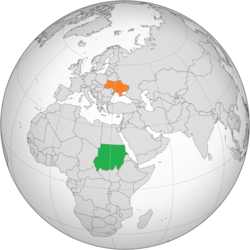 | |
Sudan | Ukraine |
|---|---|
Sudan and Ukraine have had diplomatic relations for several decades. Ukraine has a non resident ambassador in Cairo.
 | |
Sudan | Ukraine |
|---|---|
Sudan and Ukraine have had diplomatic relations for several decades. Ukraine has a non resident ambassador in Cairo.
Sudan recognized Ukrainian independence on 25 April 1992, establishing diplomatic relations soon after Ukrainian independence from the Soviet Union. [1]

In 2002, the first visit by a major Sudanese official to Ukraine took place, as the head of Sudan's Ministry of Foreign Affairs visited. Another delegation visited in 2009 to develop agricultural cooperation. [1]
After the beginning of the Russo–Ukrainian War in which Russia covertly invaded and occupied parts of Ukraine, Sudan's delegation to the UN General Assembly "mainly took a pro-Russian position" from 2014 to 2020, voting against resolutions affirming Ukraine's territorial integrity. [1] However, Sudan has supplied Ukraine with weapons after the beginning of the full-scale Russian invasion of Ukraine in 2022. In turn, Ukraine has militarily assisted Abdel Fattah al-Burhan's government directly during Sudan's civil war that began in 2023 due to shared interests in combating Russia, which backs the Rapid Support Forces in Sudan. [2] In August 2023, it was revealed that Ukraine planned to build a new embassy in Sudan, as part of a larger strategy of establishing better relations with African countries. [3]
As of 2019, there were 332 Sudanese students studying abroad in Ukraine. [4]
The Embassy of Sudan, Ukraine was established in September 2013. There is also an Honorary Consulate of Ukraine in Khartoum, Sudan. [1]